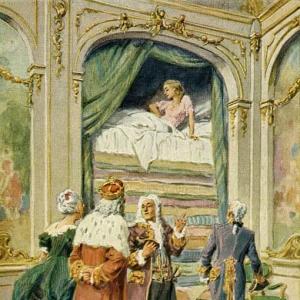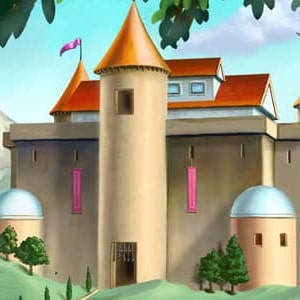Reading time: 9 min
Attention: This is a scary story.
There were once three apprentices, who had agreed to keep always together while travelling, and always to work in the same town. At one time, however, their masters had no more work to give them, so that at last they were in rags, and had nothing to live on. Then one of them said, „What shall we do? We cannot stay here any longer, we will travel once more, and if we do not find any work in the town we go to, we will arrange with the innkeeper there, that we are to write and tell him where we are staying, so that we can always have news of each other, and then we will separate.“ And that seemed best to the others also. They went forth, and met on the way a richly-dressed man who asked who they were. „We are apprentices looking for work; Up to this time we have kept together, but if we cannot find anything to do we are going to separate.“ – „There is no need for that,“ said the man, „if you will do what I tell you, you shall not want for gold or for work; nay, you shall become great lords, and drive in your carriages!“ One of them said, „If our souls and salvation be not endangered, we will certainly do it.“ – „They will not,“ replied the man, „I have no claim on you.“ One of the others had, however, looked at his feet, and when he saw a horse’s foot and a man’s foot, he did not want to have anything to do with him. The Devil, however, said, „Be easy, I have no designs on you, but on another soul, which is half my own already, and whose measure shall but run full.“ As they were now secure, they consented, and the Devil told them what he wanted. The first was to answer, „All three of us,“ to every question. The second was to say, „For money,“ and the third, „And quite right too!“ They were always to say this, one after the other, but they were not to say one word more, and if they disobeyed this order, all their money would disappear at once, but so long as they observed it, their pockets would always be full. As a beginning, he at once gave them as much as they could carry, and told them to go to such and such an inn when they got to the town. They went to it, and the innkeeper came to meet them, and asked if they wished for anything to eat? The first replied, „All three of us.“ – „Yes,“ said the host, „that is what I mean.“ The second said, „For money.“ – „Of course,“ said the host. The third said, „And quite right too!“ – „Certainly it is right,“ said the host. Good meat and drink were now brought to them, and they were well waited on. After the dinner came the payment, and the innkeeper gave the bill to the one who said, „All three of us,“ the second said, „For money,“ and the third, „and quite right too!“ – „Indeed it is right,“ said the host, „all three pay, and without money I can give nothing.“ They, however, paid still more than he had asked. The lodgers, who were looking on, said, „These people must be mad.“ – „Yes, indeed they are,“ said the host, „they are not very wise.“ So they stayed some time in the inn, and said nothing else but, „All three of us,“ – „For money,“ and „And quite right too!“ But they saw and knew all that was going on. It so happened that a great merchant came with a large sum of money, and said, „Sir host, take care of my money for me, here are three crazy apprentices who might steal it from me.“ The host did as he was asked. As he was carrying the trunk into his room, he felt that it was heavy with gold. Thereupon he gave the three apprentices a lodging below, but the merchant came up-stairs into a separate apartment. When it was midnight, and the host thought that all were asleep, he came with his wife, and they had an axe and struck the rich merchant dead; and after they had murdered him they went to bed again. When it was day there was a great outcry. The merchant lay dead in bed bathed in blood. All the guests ran at once but the host said, „The three crazy apprentices have done this;“ the lodgers confirmed it, and said, „It can have been no one else.“ The innkeeper, however, had them called, and said to them, „Have you killed the merchant?“ – „All three of us,“ said the first, „For money,“ said the second; and the third added, „And quite right too!“ – „There now, you hear,“ said the host, „they confess it themselves.“ They were taken to prison, therefore, and were to be tried. When they saw that things were going so seriously, they were after all afraid, but at night the Devil came and said, „Bear it just one day longer, and do not play away your luck, not one hair of your head shall be hurt.“
The next morning they were led to the bar, and the judge said, „Are you the murderers?“ – „All three of us.“ – „Why did you kill the merchant?“ – „For money.“ – „You wicked wretches, you have no horror of your sins?“ – „And quite right too!“ – „They have confessed, and are still stubborn,“ said the judge, „lead them to death instantly.“ So they were taken out, and the host had to go with them into the circle. When they were taken hold of by the executioner’s men, and were just going to be led up to the scaffold where the headsman was standing with naked sword, a coach drawn by four blood-red chestnut horses came up suddenly, driving so fast that fire flashed from the stones, and someone made signs from the window with a white handkerchief. Then said the headsman, „It is a pardon coming,“ and „Pardon! pardon!“ was called from the carriage also. Then the Devil stepped out as a very noble gentleman, beautifully dressed, and said, „You three are innocent. You may now speak, make known what you have seen and heard.“ Then said the eldest, „We did not kill the merchant, the murderer is standing there in the circle,“ and he pointed to the innkeeper. „In proof of this, go into his cellar, where many others whom he has killed are still hanging.“ Then the judge sent the executioner’s men thither, and they found it was as the apprentices said, and when they had informed the judge of this, he caused the innkeeper to be led up, and his head was cut off. Then said the Devil to the three, „Now I have got the soul which I wanted to have, and you are free, and have money for the rest of your lives.“
 Learn languages. Double-tap on a word.Learn languages in context with Childstories.org and Deepl.com.
Learn languages. Double-tap on a word.Learn languages in context with Childstories.org and Deepl.com.Backgrounds
Interpretations
Adaptions
Summary
Linguistics
„The Three Apprentices“ is a German fairy tale collected by the Brothers Grimm, who were famous for their work in preserving and popularizing German folklore during the early 19th century. Jacob and Wilhelm Grimm were linguists, cultural researchers, and authors, and they released their first volume of „Grimm’s Fairy Tales“ (originally titled „Children’s and Household Tales“) in 1812. The collection, which includes over 200 stories, has become an integral part of Western literary culture and has been translated into numerous languages.
The Brothers Grimm were known for gathering their stories from various sources, including oral accounts from friends, family, and other storytellers. Many of the tales they collected have roots in ancient folklore and often contain themes and motifs that are universal across different cultures. While some of the stories have dark themes and cautionary messages, others focus on morality, adventure, and fantasy.
„The Three Apprentices“ is one of the lesser-known tales in the Grimm collection, and it shares some common themes with other tales in the collection, such as deception, the supernatural, and justice. The story features familiar archetypes, such as the Devil in disguise, and it provides moral lessons on the importance of unity, the dangers of greed, and the value of truth and justice. Like many other Grimm tales, „The Three Apprentices“ has elements of dark fantasy and serves as an allegorical exploration of human behavior and values.
„The Three Apprentices“ offers various interpretations and themes that can be explored:
The power of unity and friendship: The three apprentices stick together throughout the story, facing adversity as a unit. This emphasizes the strength that comes from unity and the importance of camaraderie and loyalty in overcoming difficult circumstances.
Temptation and consequences: The apprentices are tempted by the Devil with the promise of wealth and success. While they manage to escape unharmed in the end, their decision to accept his offer initially leads to their entanglement in a murder and near execution. This serves as a reminder that giving in to temptation may have unforeseen and dangerous consequences.
The deceptive nature of appearances: The richly-dressed man with a horse’s foot and a man’s foot is revealed to be the Devil in disguise. The innkeeper, initially appearing to be a trustworthy figure, is later exposed as a murderer. This highlights the theme of appearances being deceptive and that one should not blindly trust others without deeper understanding.
The dangers of greed: The innkeeper’s greed leads him to murder the merchant, ultimately resulting in his own execution. This serves as a cautionary tale about the perils of succumbing to greed, emphasizing the importance of moral integrity over the pursuit of material wealth.
The role of fate and divine intervention: The Devil’s intervention in the apprentices‘ lives alters their destinies, ultimately allowing them to reveal the truth and escape punishment. This raises questions about fate, free will, and the potential influence of supernatural forces in shaping human lives.
Justice and redemption: Despite the apprentices‘ seemingly hopeless situation, justice is eventually served, and the innkeeper pays for his crimes. The story highlights the importance of standing up for the truth, even when it seems impossible to prevail, and suggests that redemption is attainable for those who remain steadfast in their convictions.
„The Three Apprentices“ is not as well-known as some of the other fairy tales from the Brothers Grimm, but it has still been adapted in various forms over the years. Here are a few adaptations:
„The Three Tradesmen“ by Andrew Lang: This version of the story is included in Lang’s „The Blue Fairy Book“ and is similar to the original tale. However, in this version, the tradesmen are a tailor, a goldsmith, and a shoemaker.
„The Three Suitors“ by Arthur Ransome: In this retelling, the story is changed to focus on three suitors who compete for the hand of a princess by performing various tasks. The tasks include building a bridge, making a coat, and creating a lock that only the creator can open.
„The Three Apprentices“ by Rachel Isadora: This children’s book adaptation features illustrations inspired by African textiles and tells the story of three apprentices who create a hat, a drum, and a necklace for the king.
„The Three Little Pigs“ by James Orchard Halliwell: This adaptation of the story changes the tradesmen to pigs who build their own houses. The first two pigs build houses out of straw and sticks, which are destroyed by the wolf. The third pig, who is a carpenter, builds a sturdy house out of bricks that withstands the wolf’s huffs and puffs.
„The Three Rogues“ by Robert D. San Souci: This retelling of the story is set in medieval Europe and features three roguish brothers who use their wits and skills to outsmart their opponents.
These adaptations all put a unique spin on the original story, but they all retain the themes of teamwork, creativity, and resourcefulness that are central to the original tale.
In „The Three Apprentices“ by Brothers Grimm, three apprentices who had always worked together find themselves unemployed and struggling. They decide to separate if they can’t find work in the next town. On their journey, they encounter a richly-dressed man with a horse’s foot and a man’s foot, who offers them a deal: if they follow his instructions, they will become wealthy and successful. They agree, as the man reassures them that their souls won’t be endangered, for he only seeks another soul that is already half his.
The Devil gives them each a phrase to repeat and prohibits them from saying anything else. The first apprentice must say „All three of us,“ the second „For money,“ and the third „And quite right too!“ If they follow these instructions, their pockets will never be empty. They receive money and head to a specific inn. At the inn, they communicate solely through their designated phrases, drawing attention as madmen.
A merchant arrives at the inn, worried that the apprentices might steal his money. The innkeeper agrees to safeguard the money, but later that night, he and his wife murder the merchant and steal his riches. In the morning, the merchant is found dead, and the innkeeper blames the three apprentices. When questioned, the apprentices can only respond with their phrases, seemingly confessing to the crime.
They are taken to court, and despite their fear, the Devil appears to reassure them that they will be unharmed. The judge sentences them to death, but before they are executed, a carriage arrives with a pardon. The Devil emerges as a nobleman, freeing the apprentices and allowing them to speak. They reveal the innkeeper’s guilt, leading to his execution, and the Devil claims his soul. The apprentices are freed, and their newfound wealth ensures their prosperity for the rest of their lives.
The fairy tale „The Three Apprentices“ by the Brothers Grimm presents intriguing themes and motifs that can be analyzed through a linguistic and narrative lens.
Below, I explore several aspects of the tale
Repetition and Parallelism: The tale uses repetition as a key stylistic device with the phrases: „All three of us,“ „For money,“ and „And quite right too!“ This repetition emphasizes the mechanical nature of the apprentices‘ responses, highlighting their compliance with the Devil’s instructions.
Dialogue: Dialogue plays a crucial role in advancing the plot. The limited variety in answers given by the apprentices („All three of us,“ etc. ) contrasts with more varied speech by other characters, accentuating the apprentices‘ peculiar behavior and the consequences thereof.
Contrasts: The language contrasts, from the opulent descriptions associated with wealth („richly-dressed man,“ „noble gentleman, beautifully dressed“) to the grim reality of murder and deception, underscore the dualities present in the tale.
Themes and Motifs
Temptation and Bargain: The presence of the Devil as a tempter introduces the age-old theme of Faustian bargains. The apprentices‘ agreement to follow the Devil’s instructions for wealth reflects a common motif where individuals grapple with moral choices and the allure of material gains.
Identity and Deception: The apprentices‘ repetitive answers serve as both protection and deception. Their limited speech acts as a linguistic shield that initially protects them but ultimately leads to their wrongful accusation, showcasing the precariousness of identity in communication.
Justice and Injustice: The wrongful accusation of the apprentices and their eventual exoneration highlight themes of justice. The tale explores the idea that truth will ultimately prevail, even when manipulation is at play.
Role of the Supernatural: The Devil’s role is central, highlighting the supernatural’s influence on human affairs. The twist reveals his motives, showcasing the complexity of morality and justice, where evil intentions yield a form of justice.
Narrative Structure
Linear Progression: The story follows a linear progression from the apprentices‘ initial dilemma to their redemption, reinforcing the idea of a journey, both physical and moral.
Character Development: The apprentices undergo a transformation from passive followers to active truth-tellers, enabled by the supernatural intervention, reflecting a typical folktale motif of character evolution through trials.
Resolution: The resolution ties together the tale’s moral dimensions, where the Devil’s fulfillment of his aims concludes the apprentices‘ struggle, and justice is served by unconventional means.
Conclusion
„The Three Apprentices“ uses linguistic patterns and a structured narrative to explore themes of temptation, morality, and justice. The interplay between human choices and supernatural elements creates a rich tapestry that underscores the complexity of ethical dilemmas and the ultimate triumph of truth. The tale’s linguistic simplicity belies its profound thematic depth, characteristic of the Brothers Grimm’s storytelling style.
Information for scientific analysis
Fairy tale statistics | Value |
|---|---|
| Number | KHM 120 |
| Aarne-Thompson-Uther-Index | ATU Typ 360 |
| Translations | DE, EN, ES, PT, IT, JA, NL, PL, RU, TR, VI, ZH |
| Readability Index by Björnsson | 27.8 |
| Flesch-Reading-Ease Index | 84.1 |
| Flesch–Kincaid Grade-Level | 6.1 |
| Gunning Fog Index | 9.3 |
| Coleman–Liau Index | 7.4 |
| SMOG Index | 8.6 |
| Automated Readability Index | 6.4 |
| Character Count | 6.130 |
| Letter Count | 4.604 |
| Sentence Count | 63 |
| Word Count | 1.168 |
| Average Words per Sentence | 18,54 |
| Words with more than 6 letters | 108 |
| Percentage of long words | 9.2% |
| Number of Syllables | 1.435 |
| Average Syllables per Word | 1,23 |
| Words with three Syllables | 54 |
| Percentage Words with three Syllables | 4.6% |

 Facebook
Facebook  Whatsapp
Whatsapp  Messenger
Messenger  Telegram
Telegram Reddit
Reddit














